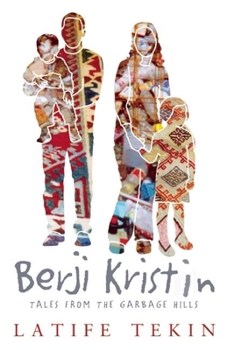Berji Kristin: Tales from the Garbage Hills
Select Format
Select Condition 
Book Overview
The cast-offs of modern urban society are driven out onto the edges of the city and left to make a life there for themselves. They are not, however, in any natural wilderness, but in a world of refuse and useless junk - a place which denies any form of sustainable life. Here, the unemployed, the homeless, the old and the bereft struggle to build shelters out of old tin cans, scavenge for food and fight against insuperable odds. And yet somehow they survive: it seems that society thrives on the garbage hills because it has always been built on one. In this dark fairy tale full of scenes taken from what has increasingly become a way of life for many inhabitants on this planet, Latife Tekin has written a grim parable of human destiny. A major best seller in her native Turkey, Latife Tekin maintains a politically active presence and has written a number of literary works.
Format:Paperback
Language:English
ISBN:0714530115
ISBN13:9780714530116
Release Date:July 2000
Publisher:Marion Boyars Publishers
Length:160 Pages
Weight:0.62 lbs.
Dimensions:0.5" x 5.3" x 8.4"
Customer Reviews
3 ratings
A unique voice
Published by Thriftbooks.com User , 19 years ago
Latife Tekin is a Turkish woman who began writing shortly after the military coup of 1980. In this short novel, she describes poor squatters who build their shanty town on hills of garbage dumped outside of Istanbul. The translators must have worked well, for I hear Tekin's singular voice clearly through the static of translation. Tekin's voice evokes a mindset, a web of beliefs in rumor and in superstition, a mindset of naïve ignorance. Her characters' beliefs are in motion, transforming themselves with time, like the shifting forms of clouds. Yet these beliefs serve an unchanging function: to bring some hope and comfort to the miserable lives of squatters in cardboard and tar paper huts in a stinking dump. Here's an excerpt. "One morning a stone with an inscription was uncovered behind the mosque on Factory Foot. Word spread through the huts that a saint lay under the stone, and it was considered an offence to urinate or spit on the spot or pass by without saying a prayer. The whole community went to the stone and prayed for water. Metal bowls and little tins were filled with water and lined up round the stone to show the saint what water was. They explained the difficulties of carrying water from wells on top of far-way hills in tins dangling from both ends of a yoke slung across their backs. Buttons were undone and backs bared, and everyone in turn showed the stone the calluses on their necks and backs... But not one drop of water could be had from `Water Father' and in time people forgot they had ever prayed to him for water. Instead childless women and those with wishes to be fulfilled took him whatever they could spare from the little water in their cans - until there were so many bowls and tins at Factory Foot that they blocked the way." There is hard content here, as Tekin speaks of factories that poison the shanty town with their chemical emissions that emit snow-like powder into the air and pump their blue waste water for the inhabitants, causing suppurating sores and loss of babies. She speaks of huts bull-dozed by the police and of roofs and huts knocked down or carried off by wind storms. Tekin recounts repeated beatings of women by their short-tempered and controlling husbands. This would be a socialist-realist and slightly feminist novel, and both strident and unreadable, without the use of fantasy and without the relief offered by Tekin's varied and comical characters. To some extent, Tekin's style evokes the Latin American writers from the 1960s onward, especially Gabriel Garcia Marquez. The style evokes the Ivorian Ahmadou Kourouma's stunning Allah n'est pas obligé... (God is not obligated...), which used humor and comic voice to render bearable the suffering of child warriors and exploited child laborers. Yet her voice remains original. I look forward to reading more.
Offers Keen Insight into the Migrant's Plight
Published by Thriftbooks.com User , 25 years ago
Latife Tekin tells the incredible story of a group of rural migrants who build a shantytown in a garbage dump and their experiences in trying to adapt to urban life. A nameless narrator recounts the abstract history of the garbage hills from the point of view of a removed observer, which leaves plenty of room for Tekin's characters to take center stage. Although the inhabitants of the shantytown are simple folk, their stories are told in such rich language that even the most mundane events in their lives stir emotion. Tekin presents the hill dwellers as ignorant victims of the changes swirling around them. Their exploitation by outsiders (factory bosses and politicians) and their manipulation by one of their own (a Muslim cleric) are among many tales the author weaves with poetic language and wry wit. No specific dates or places (other than the hills and their immediate vicinity) are mentioned, but the setting and pace of the novel roughly coincide with that of the massive growth of shantytowns and factories on Istanbul's outskirts during the 1970s. Ruth Cristie and Salina Paker have done an excellent job in keeping the author's flowery prose intact in the English translation, but Tekin's constant use of metaphors may loose readers who are not well grounded in Turkish culture.
She made a new language
Published by Thriftbooks.com User , 26 years ago
Latife Tekin made a new language:Her first book, 'Berci Kristin Çöp Masallarý'is written by angels. But the angels live in the ghetto and they are ugly.This is Berji Kristin.Post-Criticum: You MUST read 'Ice Swords' but it isn't publishing yet.So, you should learn Turkish...






